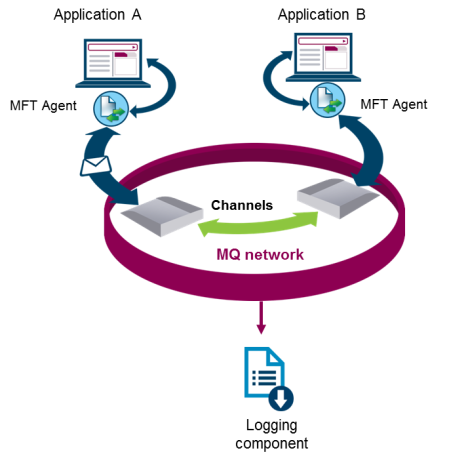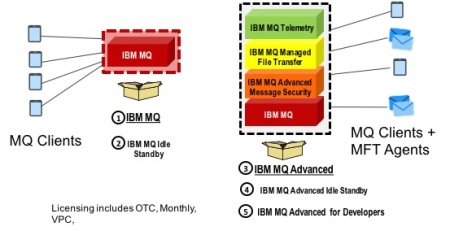
Last year my son did a school project on flight – and his project focused on Leonardo da Vinci, and it was fascinating for us all to learn more about Leonardo’s genius. Not just an artist, his incredible imagination seemed to create and explore new worlds, never dreamed of before. And yet for all his visionary ideas, his quote above also stands out: “Simplicity is the ultimate sophistication”.
The same idea can be seen in Blaise Pascal (and Mark Twain) saying “I didn’t have time to write a short letter, so I wrote a long one instead”. Sadly this applies to this blog entry as well so in the interests of brevity, a quick summary of what’s described in more detail below:
IBM is simplifying the MQ licensing for new purchases:
• Parts now as follows: MQ, MQ Advanced, MQ Idle Standby, MQ Advanced Idle Standby, MQ Advanced for Developers
• MFT Agents are no longer separately and individually licensed but are free to deploy and use when connected to MQ Advanced entitled Queue Managers – essentially providing a free to use MQ MFT network when you use MQ Advanced
• The parts being withdrawn are only those for new entitlements to the separate MQ MFT, MQ AMS and MQ Telemetry parts but not the Subscription and Support renewal parts – you can continue with your existing entitlement as before.
• If you have MQ Advanced today this change applies to all your existing MQ Advanced entitlement – not just to the latest MQ V9.0.1 release.
Today, our world is moving faster and faster. Businesses need to be more agile. Do more with less. Get more for their money. Keeping things simple makes sense today. Even more so as business environments are highly dynamic, and need to balance between unique requirements and common deployments for ease of development, deployment, operations and maintenance.
When it comes to critical offerings like IBM MQ – providing reliable, secure, scalable and robust enterprise messaging, why should we make it more complex than it needs to be? From January 24th 2017, IBM is simplifying the IBM MQ licensing structure to make it simple to describe, simple to purchase, simple to understand and simple to deploy and use.
What are we talking about? Well, for nearly 25 years IBM has been selling IBM MQ – and we still are. But for almost 15 years IBM has been selling extensions to IBM MQ as separate offerings: MQ Managed File Transfer, MQ Advanced Message Security and MQ Telemetry. These all built on and extended the value offered by IBM MQ – and in 2012, as part of MQ V7.5 we brought all the separate components together into a single package, and also created a single offering called MQ Advanced to provide entitlement to the MQ Server along with all of the MQ Server extensions.
Since then, MQ Advanced has been the most popular way to extend MQ, over buying the individual product parts. However, there was always a complexity about the MQ Advanced license for customers using it for Managed File Transfer. This was because MQ’s Managed File Transfer was available as both the MFT Service component that came with MQ Advanced, but also was licensed as MQ MFT Agents on a per Install basis. Even though you might have bought lots of MQ Advanced licenses, you would still need to buy MQ MFT Agents for those systems where you wanted to deploy MQ managed file transfer capabilities, but where you didn’t have MQ Advanced installed. This would be even more noticeable since MQ V9.0.1 shipped which allowed the MQ MFT Agents to be redistributable and made them available in a zip format, suitable for embedding in other solutions. Having per install licensing for MFT Agents would restrict the potential for use of this style of deployment.

As part of this license change, the MQ MFT Agents are no longer chargeable, or licensed per Install. Instead they are free to deploy and use – in any quantity, as long as the appropriate MQ Servers are licensed with MQ Advanced entitlements. The Agent QM, and the co-ordination QM, and the Logging QM for the MFT Agents must all have MQ Advanced entitlement. These can be all the same Queue Manager, or they can be separated – but all must have MQ Advanced entitlement – but then all MQ MFT Agents using these QMs can be deployed and used at no cost, whether 1 Agent, 100 Agents or more.

The licensing for MQ and MQ Advanced going forward is now very simple. You select IBM MQ if you just want MQ, or IBM MQ Advanced if you want MQ and any other capability. Both are licensed by PVU (perpetual or monthly license) – so by the capacity of the machine where you install the MQ server or by the Virtual Processor Core as described here. Along with IBM MQ and IBM MQ Advanced, there are Idle Standby parts for both, and also IBM MQ Advanced for Developers. Just a handful of parts giving you so much potential for your business.
The additional features in MQ Advanced include MQ Managed File Transfer (as mentioned above) which allows the contents of files to be sent reliably and securely over the MQ network as MQ messages. Differentiating factor with this solution is that the file contents can be directly consumed as messages, moving file transfer into virtually real time data usage. Now available to be deployed anywhere at no additional cost when connected to MQ Advanced Queue Managers. Then there is Advanced Message Security, which provides end to end message content encryption. Since MQ V9 this has a new option allowing for encryption at virtually no impact to performance or throughput, helping you protect your business and customer data from exposure in the case of a breach. And MQ Telemetry which enables your MQ applications to connect directly using the MQTT protocol to mobile phones and the Internet of Things.
It’s all so much simpler now to explain, to buy and to use. But what if you have previously bought some of the separate parts. We have made sure to keep the existing renewal parts available so you can continue to use them and stay current with support on them. So nothing needs to change – you can continue exactly as before. But you might want to consider moving to MQ Advanced entitlement as only this will provide the ability to connect MQ MFT Agents at no cost, and there is no entitlement to buy or deploy new MQ MFT Agents without MQ Advanced entitlement in the future. Existing purchased MQ MFT Agent entitlements remain valid and can continue to be deployed and used.
Feel free to reach out to your IBM rep, your IBM business partner or even me to discuss this, and what it might mean to you. We have tried to do this very carefully so that there is no negative impact on anyone today, and that going forward there are lots of benefits – such as the ability to deploy a much larger MQ managed file transfer network at no additional cost with MQ Advanced entitlement. And as an added change, we have ensure that the MQ Appliance license also allows for connection of MQ MFT Agents at no cost – so that provides an additional deployment and connectivity option for MQ MFT solutions.

I will try to write another blog shortly about our MQ Managed File Transfer solution soon – but this one needs to end so you can get back to work.
Think what you can do with this now. It’s going to be a busy year. Let’s start now.
Tags: end to end encryption, IBM MQ, IBM MQ V9, managed file transfer, MFT, MFT Agent, MQ Advanced, MQ Advanced Message Security, MQ AMS, MQ MFT, MQ Queue Manager, MQ V9.0.1, Security, Software Licensing
January 26, 2017 at 12:01 pm
[…] Simple can be better – the new MQ and MQ Advanced licensing […]
February 27, 2017 at 11:07 pm
Thanks Leif,
how does this affect a site using MQ Appliances? Can they now deploy MFT without additional cost?
February 28, 2017 at 11:15 am
Hi Neil – The good news is that the licensing for MQ Appliances was updated so that they are treated the same as MQ Advanced for MFT Agent connectivity. Therefore if you have MQ Appliances, you can deploy and connect any number of MFT Agents to them at no additional cost.
February 28, 2017 at 9:31 pm
Brilliant, thanks for the quick answer Leif.
March 8, 2017 at 1:03 pm
Hey Leif. Does this affect customers running MQ on z/Linux?
March 8, 2017 at 2:42 pm
Hi Tom, z/Linux is treated as another ‘distributed release’ so this applies there. So if you have MQ Queue Managers on z/Linux then you need to ensure they have MQ Advanced entitlements to allow for MFT Agents to connect to them.
The same applies for MFT Agents connecting directly to MQ on z/OS – the z/OS entitlement needs to be MQ Advanced z/OS or MQ Advanced z/OS VUE.
Does that help?
Leif
June 6, 2017 at 8:39 pm
[…] when there may have been an issue in the completion of a file transfer. This is in addition to the license changes made recently that makes this far more attractive for deploying MQ MFT Agents widely through the […]
September 26, 2017 at 10:54 am
[…] and authorization to secure your MQ system, end-to-end encryption is available as part of MQ Advanced and MQ Appliance to supplement […]
February 27, 2018 at 8:29 pm
Hi Leif, I’ve read the above comments, but still unclear…if we have MQ Advanced for distributed systems licensing, can we put a MFT Agents on our Mainframe?
February 27, 2018 at 11:00 pm
Hi David
The licensing for MQ MFT on z/OS is separate from distributed platforms. Therefore to deploy any MFT Agents on mainframe z/OS you would need MQ Advanced for z/OS VUE which allows you not only to deploy MFT Agents on mainframe, but to do so on a separate partition from the MQ z/OS QM if you need. But you always need to connect a MFT Agent on z/OS to a z/OS QM, and a MFT Agent on distributed to a distributed QM.
April 8, 2018 at 12:45 am
Simple can be better
[…]As an illustration, unless you are an architect, you positively would not need to attempt to attract up plans in your new dream home.[…]
July 11, 2018 at 10:16 am
[…] end to end encryption in MQ Advanced is policy-based and doesn’t require application updates. In fact, the applications themselves […]